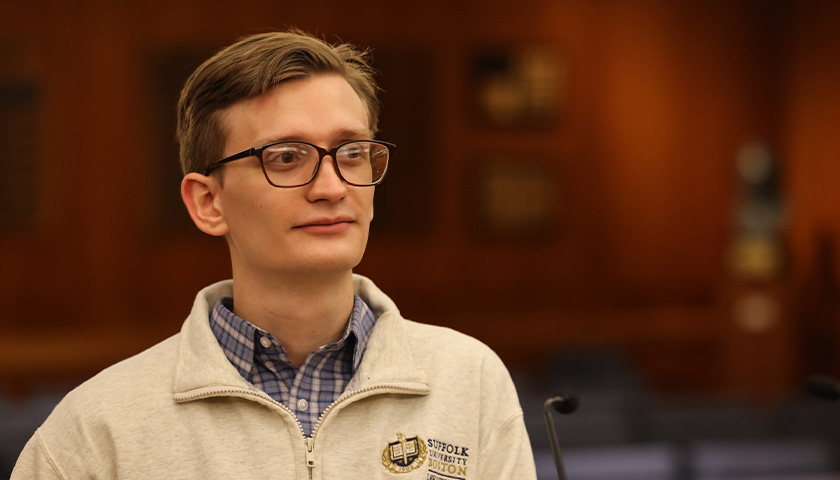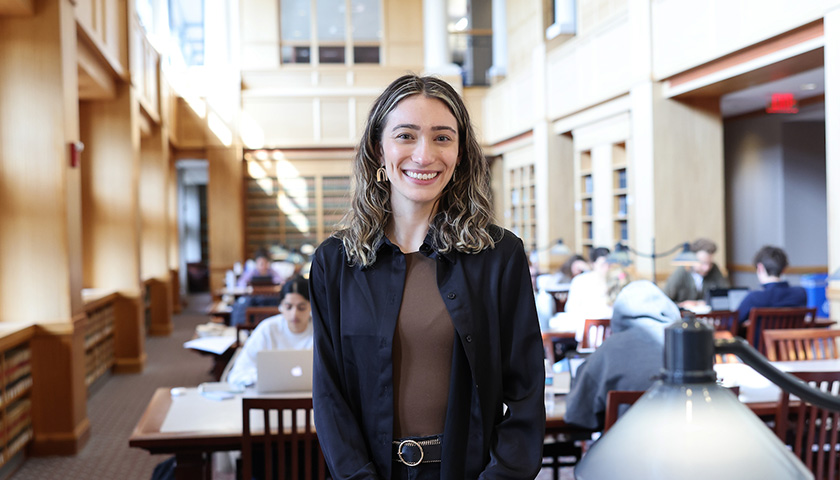Advocating for Answers

‘Homelessness Is Not Inevitable’: Timothy Scalona, JD ’24
When he was in eighth grade, Suffolk Law 3L Timothy Scalona, his six brothers and sisters, and his parents gathered their clothes, some pans and dishes, and a few prized possessions, put them in boxes and walked out of their house—with a sheriff at the front door watching. They were being evicted after their home in Wilmington, Massachusetts, was foreclosed upon.
That event plunged the family into homelessness. Scalona recalls years of eating Kwik-Mart food out of a mini-fridge or microwave oven, and often finishing a meal still hungry.
At a time when high school students are generally struggling to form an identity and friend groups, Scalona had an additional problem: how to concentrate on his homework in overcrowded shelters or cramped, rundown hotel bathrooms, which, if nothing else, offered a few feet of distance from the rest of his nine-member family. As the family shifted from hotel to hotel, some of the locations were as far as two hours away from Scalona’s high school.
He might well have ended up grinding through a series of dead-end, minimum-wage jobs, he says. Instead, he is getting ready to graduate from Suffolk Law in the top third of his class; serving as a national voice for housing and homelessness law reform in op-eds for The Boston Globe and The Washington Post; helping struggling clients as a student housing attorney; and being named one of the country’s Law Students of the Year by National Jurist.
Law Professor Renée Landers, faculty advisor for Suffolk’s Journal of Health and Biotechnology Law, works with Scalona in his role as executive editor. She describes Scalona as persistent in a way that’s inspirational.
“Tim has some searing memories fresh in his mind—life experiences that others should not have to endure,” she says. “He is tenacious and refuses to bury those experiences. So, in those moments when he might take some time for himself, instead he’s writing and delivering testimony at the Massachusetts State House on rethinking homelessness law; he’s writing op-eds for major media publications on affordable housing policy and vagrancy law reform; and rethinking the job description of child protective services workers.”
Scalona’s lived experiences make him an especially effective advocate for his clients. As a student legal aid attorney this past summer, he worked as attorney of the day at housing court, helping clients facing eviction. In one case, he recalls comforting a heartbroken client whose children were in tow, then uncovering her story and convincing the judge to remove the default judgment (which would have resulted in a speedy eviction) and allow for a trial.
While working for the public defender’s office, he helped a judge understand the steps his homeless client was taking to try to get off the streets. Instead of being held in jail before the trial, the client was freed with no cash bail and, most importantly, kept his job. And as an intern in Boston’s Office of Housing Stability, he helped over 50 low-income renters find housing, access legal resources, or apply for rental assistance.
After graduation, Scalona will continue to advocate for people experiencing eviction and housing insecurity, and, eventually, run for public office—“doing something about the systems in place that make homelessness seem inevitable, when it’s not.”

Part of the Solution: Jenna Dwy, JD ’24
Jenna Dwy, Suffolk Law Class of 2024, got an early education in disability law.
Growing up, Dwy bounced between special education and regular classes, always striving to keep pace with her peers. At the same time, she watched her single mother—who lives with a spinal cord injury—waging her own fight to keep up, navigating a maze of government benefits and social services to maintain their family’s stability.
Dwy says they were fortunate to have a strong support system of family, friends, and community advocates in their hometown of Middlebury, Connecticut, resources that are unavailable to many. And in high school, she met teachers who recognized her potential and ignited her love for learning. Understanding how difficult it can be to navigate vital systems “made me want to be a part of the solution to what I had been experiencing,” she says.
Dwy is already well on her way to a career in public service and disability advocacy law. After earning BA degrees in disability studies and human rights at the University of Connecticut, she became a community health worker at Massachusetts General Hospital—a position she held throughout law school. As a Suffolk Law student, she has interned with the Disability Unit at the De Novo Center for Justice and Healing, served as a student advocate for Veterans Legal Services in Boston, and most recently worked as a certified student attorney at the Suffolk Law Health Law Clinic (HLC).
In one of her most difficult—and rewarding—cases at the HLC, she assisted a mother seeking Social Security disability benefits for her young son. Working under a tight deadline, Dwy helped the mother, a native Spanish speaker, uncover the medical records she needed to prove why her son was eligible for benefits under the Social Security Administration’s rules. It was, Dwy says, deeply gratifying to assist another mother navigate the benefit and health systems, enabling her to tell her child’s story to the fullest extent possible.
Dwy credits Suffolk Law with providing her with an array of tools she applies toward public-service law. The wide range of classes she took helped her make connections between different areas of law and come up with more creative solutions to problems, particularly while interning with Veterans Services, where she dealt not only with complex military regulations and policies, but also public housing administrative law.
She cites Suffolk Law Professor Renée Landers as a particularly important mentor. “She asks thoughtful questions that require you to read between the lines and build your critical thinking,” says Dwy.
The Massachusetts chapter of the National Lawyers Guild recently named Dwy one of its 2024 student honorees. That recognition comes as no surprise to clinical fellow Liz Valentin, who runs the HLC. She praises Dwy’s commitment to advocating for underserved populations: “She has cheerfully taken on every assignment and volunteered to take on more work and help her classmates whenever the opportunity has presented itself. Jenna is going to continue to make Suffolk Law extremely proud.”

Fighting for Indigent Defendants: Johanna Merlos, JD ’24
It isn’t always easy to convince one judge to overrule the decision of anther, but Johanna Merlos, Suffolk Law Class of 2024, did just that. As a certified student attorney with the Suffolk Defenders Program, she persuaded a Suffolk Superior Court judge to overrule a bail decision made by a lower court. The effort meant that her low-income client was able to go free, with no bail, and instead provide a written promise to appear in court.
The lower court judge had previously set a bail amount the client would never have been able to post. “But Johanna made a terrific argument in Superior Court,” says Professor Chris Dearborn, director of the Suffolk Defenders.
Merlos is willing to go the extra mile on her clients’ behalf, Dearborn says—sometimes literally. Struggling to build trust with another client who was evasive and not forthcoming, Merlos drove to western Massachusetts to spend the day meeting with the client, Dearborn says, ultimately forging a strong relationship. After Merlos visited a jailed client twice in one week, that client compared her favorably to his earlier attorneys, saying: “I can tell you are actually going to fight for me.”
Her performance as a student attorney has drawn the attention of the Massachusetts Committee for Public Counsel Services (CPCS), which offered her one of the first slots in its incoming class of public defenders. She also won the Massachusetts Bar Association’s Oliver Wendell Holmes, Jr. award, the organization’s top honor for student public service. (She follows Nini Sprinkle, JD ’23, who won the $10,000 scholarship last year.)
Many of her clients—mostly defendants at Boston Municipal Court charged with shoplifting, assault, drug possession, or trespassing—struggle with homelessness and mental-health issues, Merlos says. “So it’s great to help them access the social services they need outside of their interactions with the criminal legal system.”
A native of Queens, New York, Merlos committed herself to assisting indigent criminal defendants for much of her law-school career. Following her first year, she interned with the Harvard Prison Legal Assistance Project and Kids in Need of Defense. Following her second year, Merlos interned with the New England Innocence Project, where she performed investigative work combing through trial transcripts and evidence.
Merlos says she’s always wanted to be a criminal-defense lawyer. But after earning a master’s degree in teaching and history from Clark University in 2017, she spent the first five years of her working life as a dual-language, middle-school history teacher. When the pandemic shifted her school to remote teaching, Merlos decided the time had come to pursue her larger career goal and came to Suffolk Law.
She says she is interested in doing post-conviction and death-penalty cases someday, but for now her focus is on her work as a Massachusetts public defender.
“CPCS is incredibly lucky to have her, as several other public defender agencies across the country were hot on her trail,” Dearborn says. “Most importantly, her indigent and marginalized clients are going to be even more fortunate to have her fighting for them next year and beyond as a public defender.”



